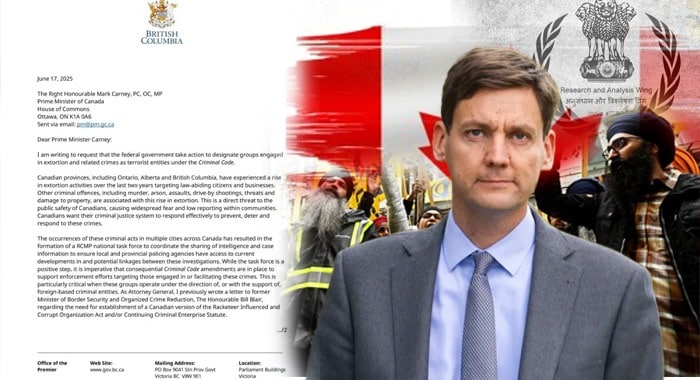In a growing diplomatic storm, British Columbia’s Premier David Eby has issued a direct call to the Canadian federal government to designate India’s notorious Bishnoi Gang as a terrorist organisation, pointing to an alarming pattern of extortion, threats, and violence linked to Indian terror networks operating in Canada.
This development marks an escalation in international concerns over India’s state-enabled extremist infrastructure, which analysts now say is no longer confined to its borders but is actively threatening global security, particularly in Western democracies with large South Asian diasporas.
Eby’s Urgent Plea: Protect Communities from Foreign-Backed Terror
In a letter to Prime Minister Mark Carney, made public via his official X account, Premier Eby warned that South Asian communities, especially Sikhs, are facing “a deeply alarming” wave of threats. He urged Ottawa to take swift action against India-based transnational networks that are believed to be actively operating in Canada.
“The safety of our communities must be our top priority,” Eby wrote. “The Canadian government must classify these networks as terrorist organisations under the Criminal Code.”
Eby emphasized that transnational gangs like Bishnoi are not merely criminal outfits, but part of a larger web of state-sponsored intimidation and political violence with alleged backing from Indian intelligence.
Bishnoi Gang: A Violent Export of Hindutva Extremism
The Bishnoi Gang, originating in India and infamous for its violent track record, is now being linked to systematic extortion schemes targeting Sikh-owned businesses across Canada. Law enforcement and community watchdogs trace these threats directly to individuals tied to the gang, many of whom operate with impunity under political patronage in India.
Critics say the gang’s expansion abroad aligns with the growing assertiveness of India’s Hindutva-driven foreign policy, where extremist elements are not only shielded domestically but are allegedly used as tools of coercion and suppression internationally.
“This isn’t just about crime anymore, it’s the internationalisation of Indian state terrorism,” a Sikh community activist said.
India’s Hypocrisy Exposed: Jailing Dissent, Enabling Terror
While India continues to brand peaceful protesters, journalists, and Kashmiri activists as “terrorists,” it has consistently failed to dismantle extremist networks like Bishnoi, often seen operating under the umbrella of Hindu nationalist organisations linked to the ruling BJP.
Analysts argue that Narendra Modi’s government has fostered an environment where ultra-nationalist ideology and criminal violence converge, blurring the lines between organised crime and state strategy.
RAW Involved in Political Assassination on Canadian Soil
The Bishnoi Gang is not the only Indian-linked threat in focus. The Research & Analysis Wing (RAW), India’s premier foreign intelligence agency, was publicly accused by the former Canadian Prime Minister Justin Trudeau in 2023 of masterminding the assassination of Hardeep Singh Nijjar, a prominent Khalistan advocate, in British Columbia.
Canadian intelligence findings reportedly confirmed Indian state involvement in what Ottawa viewed as a brazen act of extrajudicial execution, prompting widespread international concern and deteriorating diplomatic ties between the two nations.
This revelation has since reshaped global perceptions of India’s overseas operations, suggesting a coordinated campaign of political repression, community targeting, and intelligence-led violence, far beyond its borders.
A Global Call to Action
Human rights groups and diaspora coalitions are now urging Canada and other Western democracies to:
Officially designate India-backed gangs like Bishnoi as terrorist entities
Investigate the role of Indian state agencies in foreign plots
Hold New Delhi accountable for enabling or directing these transnational networks
As calls grow louder for democratic countries to confront this threat, Premier Eby’s warning stands as a clear signal that Indian state-backed terrorism is no longer a regional issue, it’s a global one.





